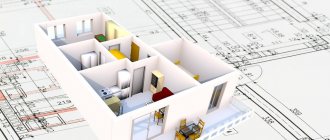Last update: 02/05/2020
Question:
I'm going to buy a house in Moscow. In addition to regular apartments, they also offer another type of housing - apartments. What is the difference between an apartment and an apartment? What is better and more profitable for living?
Answer:
If you answer briefly and generally, then for the permanent residence of the average family it is better to buy an ordinary apartment. And apartments as an investment property - to invest free funds and receive a small stable income, or as original housing for single creative individuals and creative youth
But this is very general. In fact, everything is a little more complicated. For those who want to delve deeper and understand what the differences are , let’s look at the issue in more detail.
What is better to choose for purchase – an apartment or an apartment – depends on the goals and capabilities of the Buyer. The key differences between these two housing formats are their price and legal status . The price of apartments, as a rule, is noticeably lower than that of an apartment of similar size in the same area (unless we are talking about elite apartments as part of office and hotel complexes, such as Moscow City). And the legal status of apartments does not classify them as residential premises at all. Legally, apartments are commercial real estate . And it is this status that changes a lot from the point of view of purchase, compared to traditional residential real estate (more on this below).
First, you need to explain what the difference is between an apartment and an apartment in a legal sense , and how they differ technically .
How to choose a Developer when buying an apartment in a new building? Qualitative and quantitative characteristics - see this note.
Difference No. 1 – a term from the hotel business
Apartments are non-residential premises. The definition of this concept is contained only in regulations from the hotel business sector.
In accordance with the accepted classification of hotels, the following categories of rooms are established (clause 27, section 2 of the Procedure, approved by order of the Ministry of Culture of the Russian Federation dated July 11, 2014 No. 1215):
- suite,
- apartment,
- luxury,
- junior suite,
- Studio.
The listed types of rooms are not intended for permanent registration, only for temporary stay.
Difference three: cost
The price of non-residential premises is significantly lower. This is due to the construction company’s complete lack of social obligations.
The difference in cost depends on the city. Let's take Moscow as an example: the average difference in the amount between an apartment and an apartment is 10%. Thus, the price of a non-residential complex of the comfort category for one square is 125 thousand rubles; for a similar apartment the price ranges from 140 to 150 thousand rubles.
New building regulations are currently being considered that would require apartment developers to worry about social amenities. This innovation will reduce the difference in the price of apartments and apartments to a minimum.
Difference No. 3. Two control options
If everything is clear with residential premises, there are two control options for apartments:
1. The developer sells the apartments, but the common property does not remain the property of anyone.
In this case, by analogy with the provisions of the Housing Code of the Russian Federation, such property becomes the common property of the apartment owners. By analogy with the housing complex of the Russian Federation, apartment owners gather at a general meeting of owners, choose a management organization, discuss the essential terms of the management agreement and begin to manage the common property of the apartment building.
Actions by analogy were supported by the Plenum of the Supreme Arbitration Court of the Russian Federation in Resolution No. 64 dated July 23, 2009.
With the first management option, not all articles of the Housing Code of the Russian Federation will apply by analogy. For example, Art. 158 of the Housing Code of the Russian Federation, which states that if the owners have not set tariffs, then they must be approved by local government bodies, will not apply, because the compulsory medical insurance does not have the obligations and powers to set tariffs for non-residential premises.
2. The developer sells the apartments, but leaves the common areas as his property.
If all common areas remain the property of the developer, he independently selects the management organization and all essential terms of the contracts. Owners are faced with a no-alternative decision; they have no right to choose.
Article 7 of the RF Housing Code will not be applied in this case, because an analogy of legislation is unacceptable if it contradicts the essence of the relationship.
The decision of the Khostinsky District Court of Sochi dated July 15, 2011 noted that the disputed premises (apartments) “... cannot be considered by the court as residential due to the fact that, in accordance with the current legislation of the Russian Federation, an apartment is a room in an accommodation facility.”
Also, the Federal Antimonopoly Service of the Ural District indicated that “hotels do not belong to the housing stock, and the premises located in them do not belong to residential premises” (resolution dated August 23, 2010 No. F09-5956/10-S6 in case No. A50-3584/2010).
Explanations of the RF Armed Forces on the maintenance of common property in apartment buildings
324880
Pros and cons of buying apartments as a type of housing
Since apartments in the context of purchase, as an alternative to purchasing a regular apartment (including in a house under construction), we will list their advantages , and then the disadvantages (pros and cons) relative to the traditional type of housing.
Pros (advantages) of buying an apartment:
- A noticeable gain in the purchase price compared to an apartment of a similar class. The price per square meter for apartments is approximately 15 - 25% lower.
- Location . Apartments can be sold where there is no new housing at all, and existing apartments are too expensive. For example, in the city center, in historically prestigious places, in business districts and office and hotel complexes. Possible proximity to main job.
- Free architecture and non-standard layouts . For example, the “loft” style with characteristic high ceilings, large areas of rooms without partitions and huge floor-to-ceiling windows. Up to the exotic - mezzanine floors, second light (double-light hall), terraces with winter gardens and even fireplaces.
- It is much easier here than in an apartment to coordinate the redevelopment of the premises , and to make your home even more unique. Unlike traditional housing stock with a lot of prohibitions and restrictions on reconstruction, apartments are an ideal platform for implementing various design solutions . The restrictions apply only to the integrity of the building’s structure - columns and ceilings cannot be touched.
- Developers often build car parks for residents (including underground ones) and improve the surrounding area of the apartment complex. Although they are not required to do this (according to regulations), for marketing purposes it justifies itself.
- Included with the apartments you can also receive services typical for a hotel. For example, administration of the complex, reception and waiting area in the lobby, concierges and security, floor maintenance, cleaning, ironing, etc. Additional service facilities are also possible directly on the territory of the apart-complex: spa centers, cafes and restaurants, shops, pharmacies, fitness rooms, bank branches, beauty salons, etc.;
- There is a fashion for this format of housing among the business community and creative youth (in Moscow, especially);
- The owner of the apartment can rent it out through a management company , without worrying about finding a tenant and monitoring his residence. And taking into account the purchase price and rental cost, this is a more profitable investment than a similar operation with an apartment.
For the Buyer, all the positive aspects and advantages of the apartment will be described in the best colors in the advertisement. But they try not to advertise what might bother the Buyer. But the future owner of such “non-residential property” should be prepared for what is hidden.
Is it possible to get a tax deduction when purchasing apartments - see this article.
Disadvantages (disadvantages) of buying apartments:
- At the construction stage, the Developer can sell apartments both under Equity Participation Agreements (EPA) and other types of agreements (here, the use of EPA for “non-residential” is his right, not his obligation). If the sale takes place under agreements such as PDKP or PDDU or Investment Agreement, then the Buyer remains defenseless against the Developer. But even if the Developer sells apartments under the DDU , the Buyer does not receive full protection under Federal Law-214 - the compensation fund does NOT apply to apartments. That is, in the event of bankruptcy of the Developer, the Buyer will not receive compensation from the fund , like an ordinary shareholder of multi-apartment housing.
- Impossibility of permanent registration (due to the legal status of “non-residential”). Only temporary registration is possible for apartments (up to 5 years, with the possibility of extension), and then only if this property has the status of a hotel complex.
- Due to non-compliance with building standards for housing , technical problems with sound and heat insulation of premises, insolation, etc. are possible. Kindergartens, schools and clinics are not built for apartment residents; they will have to rely only on themselves and on paid services around them.
- Increased utility bills (at rates for non-residential premises, without benefits). Especially for heating and hot water. Plus payments to the management company for additional services . This also sometimes includes rental payments for the land plot on which the building stands.
- Increased tax rate on real estate ownership. Property tax for apartments ranges from 0.5% to 2% of the cadastral value (versus 0.1% for apartments). True, the cadastral value of non-residential premises itself is usually lower than that of housing.
- maternity capital and other housing subsidies to purchase apartments . Benefits and subsidies for paying housing and communal services also do not apply to apartment owners.
- Taking out a mortgage to buy an apartment is more difficult than for an apartment. Many banks increase the interest rate for such loans or refuse them altogether.
- The impossibility of using tax deductions (personal income tax refund) when purchasing apartments, as opposed to an apartment (and these are amounts amounting to hundreds of thousands of rubles; for more details, follow the link)
- Apartment buildings do not have co-occupancy standards . If, for example, in a neighboring room someone builds a music studio, a creative office or a gambling club, then the neighbors will have no legal grounds to stop this farce. After all, formally this is a non-residential premises.
- It is impossible for apartment owners to create an HOA to jointly manage the building.
Some of these shortcomings may be eliminated in the near future. There have been proposals to change the legislation relating to apartments in 2021 (see here). It is proposed to make apartments a new type of housing and consolidate their legal status in legislation, thus reducing their differences from an ordinary apartment. In particular, it is proposed to allow permanent registration in apartments.
In addition, the increased costs of maintaining apartments (property taxes and rent) are more than offset by their reduced cost. Even rough calculations show that the money saved on the purchase covers the future “overpayment” for maintenance for decades to come.
As for lending for the purchase of non-residential premises, since 2016 the Agency for Housing Mortgage Lending (AHML) has launched a program for issuing loans for the purchase of apartments (see here).
After registering ownership, the owner of the apartment can subsequently make all the same transactions with it as with a regular apartment (donate, bequeath, sell). Although in the Extract from the Unified State Register of Real Estate it will be written “non-residential premises” .
What grounds can there be for declaring an apartment purchase and sale transaction invalid?
Difference No. 4. Tax burden
Often, owners who have purchased apartments are surprised to learn that, according to paragraph 1 of Art. 401 of the Tax Code of the Russian Federation, apartments do not belong to housing, but belong to other types of non-residential property. Accordingly, according to paragraphs 3 and 4 of Art. 403 of the Tax Code of the Russian Federation there will be other deductions, and tax benefits do not apply to non-residential premises.
Judicial practice on the legal status of apartments is contradictory. In court decisions you can even find the term “residential apartments”, for example, in the appeal ruling of the Voronezh Regional Court dated November 19, 2013 No. 33-5878. This concept is not approved by law.
What are apartments? How are they different from a regular apartment?
Externally, both of them are urban housing. That is, premises physically intended for people to live in. Physically, but not legally! Visually, it can be difficult to distinguish an ordinary residential building with apartments from a building with apartments . This is where their similarities end, and their differences .
Apartments as a type of living space are typical only for large cities, where active construction is already underway. In such cities, as a rule, the development of territories is quite dense (especially closer to the center), and it is not always possible to build new residential areas there. The shortage of land and urban planning restrictions do not allow the construction of multi-apartment residential buildings in these areas. And clearing, for example, a former urban industrial zone for housing (demolition of permanent buildings, relocation of communications, changing the status of a land plot) is too expensive.
But the Developers found a way out. They began to build non-residential complexes and sell them as residential ones . Or repurpose existing administrative and industrial buildings and make them suitable for living. That is, legally (according to documents) the building belongs to commercial (non-residential) real estate , but in fact the premises in it are intended for living . And the law allows such a combination.
The concept of an apartment is defined by law as a premises that meets all construction, sanitary and fire standards for permanent residence.
The concept of apartments is not clearly defined in the law. It is only mentioned that they must have an area of at least 40 sq.m., consist of at least two rooms, a kitchen and a bathroom (which is not always true).
Such premises are sold in buildings that have the legal status of a hotel, office center or multifunctional complex.
The popularity of apartments as a type of housing is explained by their relatively low cost . Regarding the same class of apartments . Why are apartments cheaper than apartments? This can be explained simply - their construction is much cheaper for the Developer himself. Why?
If the Developer delays delivery of the house. What should a shareholder do - see this note.
Because housing construction standards do NOT apply to commercial real estate (including apartments). This means that you may not comply with modern requirements for housing, for example, for sound insulation, thermal insulation, ventilation, fire safety, insolation (level of natural light), distance from highways and industrial facilities, etc. Moreover, the Developer is NOT obliged to provide buildings with apartments with social infrastructure . That is, he does not need to build schools, kindergartens, clinics, he does not have to worry about street lighting, parking spaces, playgrounds, landscaping, etc. There is no need to change the type of permitted use of the land plot - for the purpose of housing construction.
All this greatly reduces the Developer’s costs for implementing a project with apartments, and therefore gives him the opportunity to sell them much cheaper than apartments.
Despite this unusual housing format, for many buyers the determining factor is price . And the technical characteristics (sound and heat insulation, ventilation, etc.) may be quite satisfactory for them in the as-is condition. Social objects may also not be of decisive importance. And the individual advantages of apartments (more about them below) may outweigh their “non-residential status.”
In Moscow, for example, the share of apartments is about a quarter of total housing sales (statistics for 2021 are here). A large number of premises of this format are concentrated in the Moscow City International Business Center and in a number of office, business and hotel complexes throughout the capital.
True, Moscow is not a reflection of the situation throughout Russia. Moscow is a financial and administrative center, it is a concentration of capital and the most expensive real estate, it is a hangout of show business stars and the inhabitants of Forbes magazine. Therefore, the demand for real estate in Moscow is specific. We consider the choice between an apartment and an apartment from the position of an ordinary citizen who does not own factories, newspapers and ships.
Deposit or advance payment - what form of advance payment is used in transactions for the purchase and sale of apartments? See the link in the Glossary.
Finished and under construction apartments in Krasnodar
Do you want to buy apartments in Krasnodar? We have offers from the city's leading developers. We will book a layout for you, personally show you the property, or help you buy an apartment remotely. You don’t need to come to Krasnodar for this. Look at the layouts in the finished Pushkin Apartments & Loft complex and in the Depelopmenz Plaza project under construction. We will answer any questions about the apartments and choose for you the best solution for investing in rentals or arranging your own cozy home.
Looking for luxury real estate in Krasnodar? The company Novostroiki.SHOP will help you choose an apartment with the best characteristics to suit your request. Use the website and look at all the residential complexes on the map or take a survey to find a turnkey property with the company’s experts.
#Apartments #New buildings #New buildings_of Krasnodar #Premium_real estate #Elite_real estate
To the list of news
Next news
Difference six: tax rate
In the near future, the legislature plans to increase the tax rate on all non-residential property (this category includes apartments) from 0.1 to 0.5 percent. At the same time, the cadastral value for apartments is 0.1%.
Therefore, the difference will become really significant, but owners may not have to pay 5 times more. Local governments in the region can reduce the interest rate if they deem it necessary.
Communal apartment
Payments for utilities in apartments are on average 20–30% higher than in apartments.
Apartments are non-residential real estate, the cost of its maintenance depends on the developer's management company. It independently sets tariffs for services. And the higher the class of real estate, the more expensive the maintenance.
Also, apartment residents will not be able to take advantage of the benefits for paying utilities provided for certain categories of citizens.
In addition, apartment owners can re-elect the management company if it provides poor quality services. Apartment owners do not have this option.
Is it worth buying an apartment?
To answer this question, it is important to understand exactly the purpose of purchasing real estate. The purchase will be profitable for people who plan to rent out apartments or are simply on a limited budget and cannot afford to buy a full-fledged home. However, this benefit is noticeable only for objects at the construction stage. Resales can be both cheaper and more expensive than housing stock. For example, in some areas of Moscow the price of apartments is 40% higher than the cost of apartments. To a greater extent, choosing apartments is justified as an investment.
“Today apartments are an interesting product from the point of view of investment attractiveness,” comments Daria Morozova. — When they are transferred to housing status, the price difference that exists today will be completely leveled out. If you are thinking about purchasing, it is better to do it now, at current prices, as the cost will increase in the near future.”
Lawyer's answers to private questions
How much does it cost to convert an apartment into a residential building if you do not do it yourself, but entrust everything to a lawyer in terms of paperwork?
It all depends on the region where the property is located. In large cities, such a service costs from 70,000 rubles, in small cities – about 50,000 rubles.
When should the developer convert apartments into residential housing if they are purchased under the DDU?
This is usually done before the house is put into operation, but can be carried out after. The terms are determined by agreement with the developer.
I am currently in the process of converting apartments into housing stock. I bought real estate before marriage. If she is transferred, will everything be divided in case of divorce?
No. According to Art. 36 of the RF IC, property acquired by a spouse before marriage is only his property and is not subject to division. Changing the status of a property during marriage does not play a role. But if redevelopment or reconstruction is carried out, and as a result, the cost of housing increases significantly at the expense of general funds, on the basis of Art. 37 of the RF IC, the court may recognize such property as common property and divide it.
Can apartments be provided under a social tenancy agreement?
No. According to Art. 49 of the Housing Code of the Russian Federation, under a social tenancy agreement only residential premises belonging to a municipal or state fund are provided.
I bought apartments under the DDU in my name. It has already been commissioned, the developer recently transferred all the premises to the status of apartments, the transfer deed has not yet been signed, I have not accepted anything. Can I register ownership of my wife?
Yes. But to do this, you will have to draw up an agreement for the assignment of the right of claim, or accept the apartment and then give it to your spouse under a gift agreement.
Demand for housing is moving from the Moscow region to the capital
You cannot register in the apartments on a permanent basis, since such objects are classified as non-residential premises. But if the apartment complex has hotel status, then the owner of the apartment can obtain temporary registration for five years. Temporary registration gives practically the same rights as the owner of an apartment with permanent registration. However, says Maria Litinetskaya, when enrolling a child in a school who is not assigned to a place of residence, his application is considered after applications from residents of houses attached to the school and having permanent registration. Otherwise, there are no fundamental differences between temporary and permanent registration.







